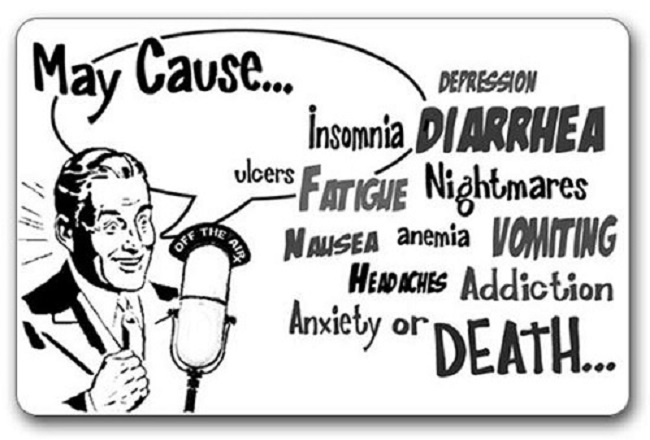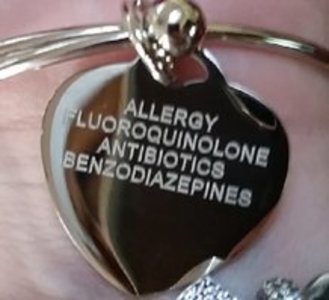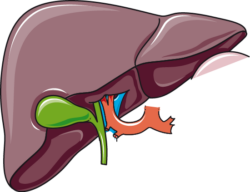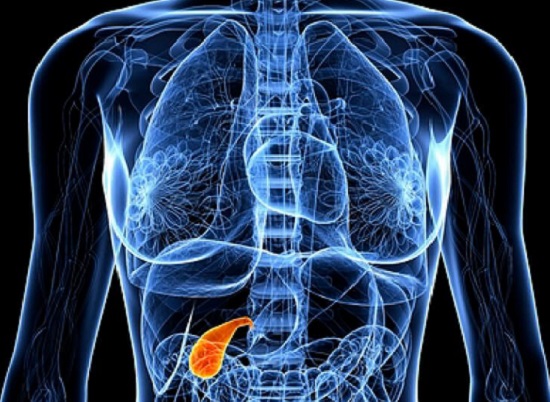Allergic Reactions versus Toxicity Syndromes
When I was twenty, I had an allergic reaction to a sulfa antibiotic. I broke out in itchy hives while I was taking the sulfa, but the hives went away as soon as I stopped taking it. I had no other symptoms nor lasting effects. I don’t recall whether or not I took Benadryl to help me recover, but I imagine that it would have helped if I had. It was clear at the time that I was having an allergic reaction to the sulfa antibiotic, but if I needed it to be verified, there are tests that could verify and validate that I am allergic to sulfa drugs.
Twelve years later, I had an adverse-reaction to ciprofloxacin, a fluoroquinolone antibiotic. For more than a year after I took the ciprofloxacin, I experienced muscle weakness and pain; autonomic nervous system dysfunction including loss of balance, inability to sweat, digestive dysmotility, dry mouth, and dry eyes; central nervous system dysfunction including memory loss, inability to concentrate, loss of reading comprehension, anxiety, and brain fog; a loss of energy (I went from doing crossfit to barely being able to walk through a shopping center); and changes in my personality. My symptoms ebbed and flowed, with some lasting for years. All my symptoms arose after I stopped taking the ciprofloxacin, and many increased in intensity long after the ciprofloxacin “should” have been out of my system. Neither Benadryl nor any other pharmaceutical I tried did anything to alleviate my symptoms. There are no tests that verify adverse reactions to fluoroquinolones, and no doctors seemed to have any clue how to treat my symptoms.
Do you see the difference in my two experiences? You should. One was a couple of hives and an itchy weekend, the other was a life-altering experience that changed my physical abilities, my thoughts, and even my way of interacting in the world.
My reaction to the sulfa antibiotic was an allergic reaction. My reaction to the ciprofloxacin was something different, and to categorize it as an “allergy” is a mistake. I am allergic to sulfa drugs. My reaction to fluoroquinolones (cipro/ciprofloxacin, levaquin/levofloxacin, avelox/moxifloxacin, floxin/ofloxacin) was worse, and another exposure to a fluoroquinolone will likely lead to my permanent disability or death.
Fluoroquinolone adverse-reactions are categorically different from allergic reactions, rather, fluoroquinolone toxicity is a syndrome of multi-symptom, chronic illness that does not go away when administration of the drug has stopped. Fluoroquinolone adverse-reactions are similar in symptoms and scope to autoimmune diseases, fibromyalgia, ME/CFS, POTS, psychiatric illnesses, neurodegenerative diseases (like ALS and Parkinson’s), and other chronic, multi-symptom, illnesses that involve multiple bodily symptoms. Like many of those diseases, fluoroquinolones adversely affect gut health, mitochondrial health, liver health, neurotransmitter balance, mineral homeostasis, hormones, and more. Fluoroquinolone toxicity is a multi-symptom, chronic, syndrome, that, for many, is incurable. You can’t take a Benadryl to get rid of it. Some people recover (just like some people recover from autoimmune diseases), but there is no single path to recovery.
Medically Induced Chronic Illness
Few people recognize that pharmaceuticals can cause multi-symptom, chronic illness SYNDROMES. They should though, because not only are millions of prescriptions for fluoroquinolones written each year (while rates of multi-symptom, chronic, mysterious illnesses go up, not entirely coincidentally), but fluoroquinolones are not the only drugs that cause multi-symptom, chronic, syndromes.
Benzodiazepine Withdrawal Syndrome
Benzodiazepines, and withdrawal from benzodiazepines, cause long-term illness that adversely affects the brain, and all aspects of the body. According to the Wikipedia entry for Benzodiazepine Withdrawal Syndrome,
“Benzodiazepine withdrawal is characterized by sleep disturbance, irritability, increased tension and anxiety, panic attacks, hand tremor, sweating, difficulty with concentration, confusion and cognitive difficulty, memory problems, dry retching and nausea, weight loss, palpitations, headache, muscular pain and stiffness, a host of perceptual changes, hallucinations, seizures, psychosis,[1] and suicide[2].”
There are many sources for additional information about the multi-symptom, chronic, illness of benzodiazepine withdrawal syndrome throughout the internet.
Post Finasteride Syndrome (PFS)
Finasteride/Propecia can cause a constellation of symptoms known as post finasteride syndrome (PFS). The Post-Finasteride Syndrome Foundation describes PFS as, “Often life-altering, PFS is characterized by devastating sexual, neurological, and physical side effects that persist in men who have taken the 5-alpha reductase type II enzyme inhibitor finasteride.” Men suffering from PFS experience symptoms long after administration of the drug has stopped. It’s not an allergy, it’s a syndrome.
Lupron Syndrome
After taking Lupron, many women reported experiencing the following effects: loss of libido, muscle and joint pain, gastrointestinal disturbances, bone loss, hair loss, dry and cracked skin, blood-sugar abnormalities, cardiovascular and respiratory problems, brain and nervous system problems, etc. Lupron use led to a multi-symptom, chronic illness–a syndrome.
Essure Syndrome
There is a Facebook group with more than 31,000 members for victims of Essure, a coil that is implanted into fallopian tubes to serve as permanent birth control. Many of the women who are victims of Essure have multiple, autoimmune-disease-like symptoms. For many of them, the Essure causes a syndrome of chronic illness and pain.
Singular Syndrome
Montelukast/Singulair, the asthma medication, has been linked with Churg Strauss Syndrome, an autoimmune condition that leads to inflammation of the blood vessels in the lungs. Churg Strauss Syndrome is a serious, incurable, autoimmune disease. It’s not an “allergy” to Singulair, it’s worse–it’s the triggering of a serious disease.
Other Medication Induced Syndromes
Lariam/mefloquine can cause ongoing, severe psychiatric problems. SSRIs, hormonal birth control, statins, and other drugs, can also cause multi-symptom illnesses. In addition to fluoroquinolones, other antibiotics can cause long-lasting syndromes. There are cases of thousands of young men and women who are suffering from the severe adverse-effects of the HPV vaccine. Even over-the-counter drugs can have long-term, multi-faceted “side-effects.”
Iatrogenic Illness Is Neither Rare nor Allergic
These iatrogenic illnesses are not rare, and it should not be a foreign notion that pharmaceuticals can cause chronic illnesses–there are thousands of patient reports noting that various pharmaceuticals have led to complex and long-lasting illnesses, and many chronic illness symptoms are listed on drug warning labels. Yet, I still receive messages like this one:
“I saw the head allergist at the hospital and still here. He said no such thing as being allergic to Levaquin. No test to prove it.”
By that doctor’s reasoning, the only adverse drug reactions that exist are the immediate allergic reactions that can be tested for and cured with antihistamines or epinephrine. Unfortunately, that simply isn’t true. There are many adverse drug reactions that look more like multi-symptom, chronic, mysterious, incurable illnesses than allergic reactions. It’s time for a paradigm shift among patients and medical providers alike to recognize not only that many pharmaceuticals can cause syndromes of illness, and that many of the recognized multi-symptom, chronic illnesses can be linked to (caused by) pharmaceutical use.
Patients who are suffering from pharmaceutical caused syndromes deserve recognition. The people who have recognized illnesses that can be linked to pharmaceutical use deserve to know that those links exist. Just because a reaction doesn’t fit into the “allergy” model, that doesn’t mean that it doesn’t exist. Pharmaceutical-caused syndromes exist, and they are just as devastating, and often worse, than recognized allergic reactions.
We Need Your Help
More people than ever are reading Hormones Matter, a testament to the need for independent voices in health and medicine. We are not funded and accept limited advertising. Unlike many health sites, we don’t force you to purchase a subscription. We believe health information should be open to all. If you read Hormones Matter, like it, please help support it. Contribute now.
Yes, I would like to support Hormones Matter.
This article was published originally on November 22, 2016.










